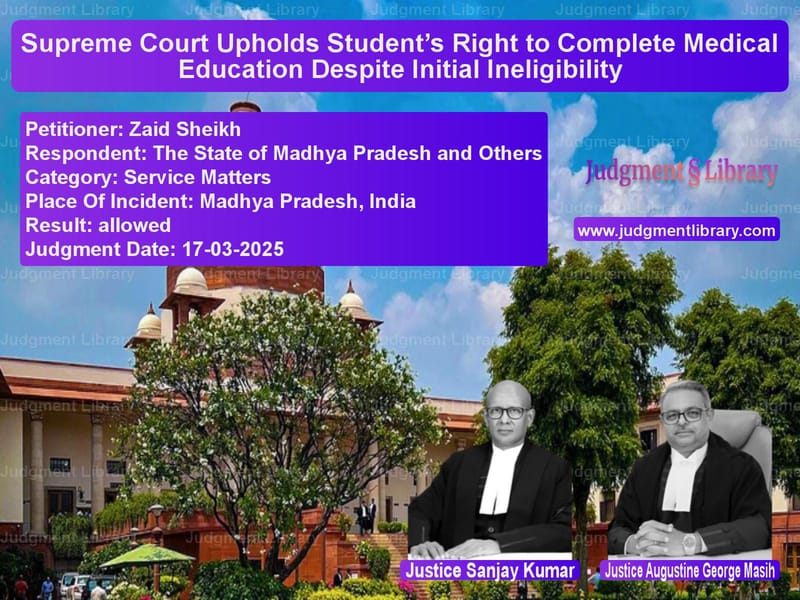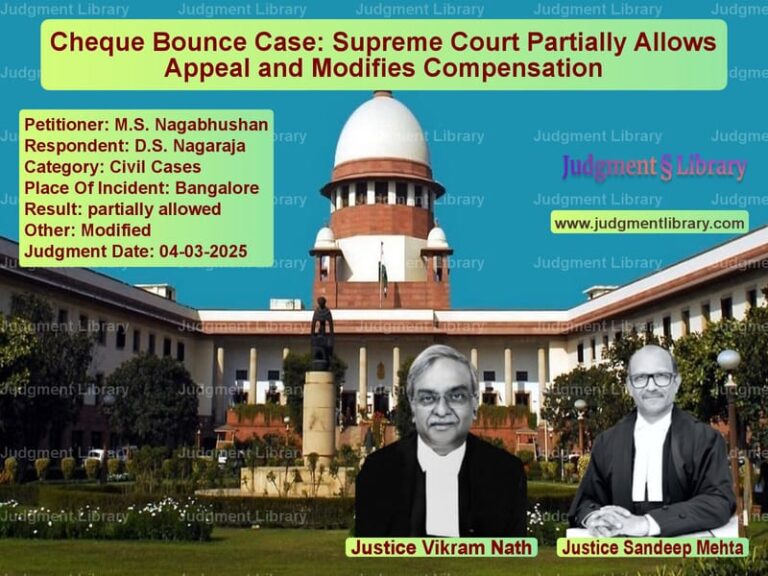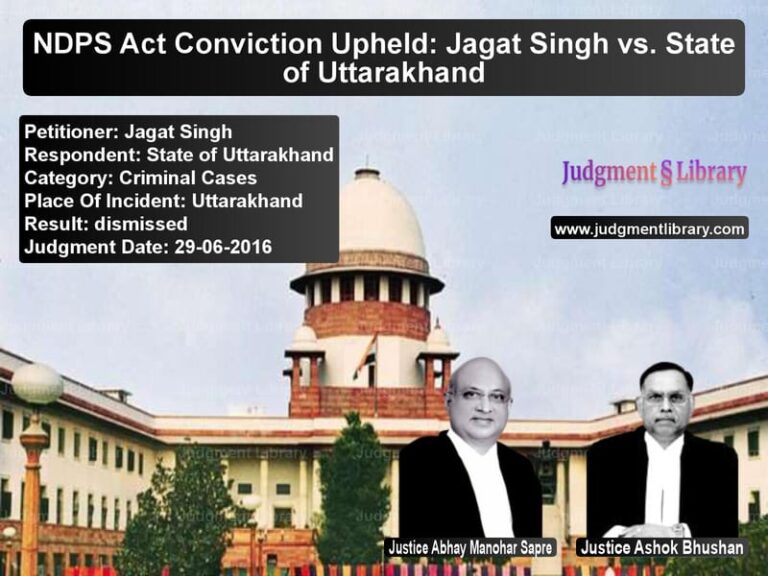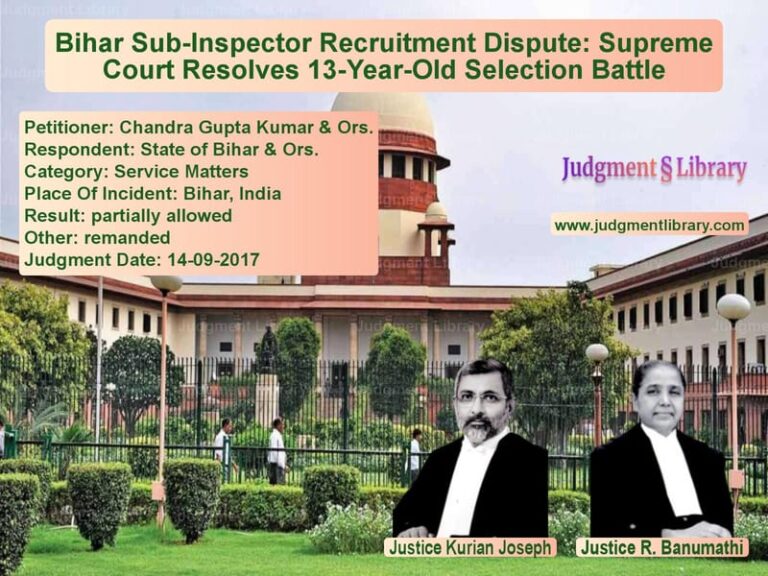Supreme Court Upholds Student’s Right to Complete Medical Education Despite Initial Ineligibility
The Supreme Court of India has delivered a landmark ruling in the case of Zaid Sheikh vs. The State of Madhya Pradesh & Others, addressing the question of whether a student who was initially ineligible for admission to a medical course but later met the eligibility criteria should be allowed to complete his studies. The Court ruled in favor of the appellant, permitting him to complete his Bachelor of Ayurvedic Medicine and Surgery (B.A.M.S.) degree and internship, thereby overturning the decision of the Madhya Pradesh High Court.
The ruling is significant as it balances the strict application of eligibility rules with the principle of fairness, particularly in cases where a student has already spent years completing their education. The Supreme Court recognized that an act of the court should not harm an individual (Actus Curiae Neminem Gravabit) and set aside the High Court’s ruling to ensure justice for the appellant.
Background of the Case
The case originates from the admission of Zaid Sheikh to the B.A.M.S. degree program at Smt. Dhairya Prabha Devi Sojatia Ayurvedic Medical College, Neemthur, in 2008. The appellant had completed his 10+2 education from the Madhya Pradesh Sanskrit Board, Bhopal, but had not taken ‘English’ as a subject, which was a mandatory eligibility criterion for admission to the medical course.
Despite this, he was granted admission and successfully completed his first-year examinations. However, the college was later de-recognized, and its students were transferred to Shaskiya Swasashi Dhanwantari Ayurvedic Medical College, Ujjain, in 2012. The appellant was denied this benefit on the grounds that he did not meet the eligibility criteria at the time of his initial admission.
Legal Proceedings
Filing of the Writ Petition
Challenging this decision, the appellant filed Writ Petition No. 10267 of 2012 before the Madhya Pradesh High Court. The High Court granted interim relief, allowing him to continue attending classes.
Interestingly, the Principal of Shaskiya Swasashi Dhanwantari Ayurvedic Medical College, Ujjain, had issued an allotment letter dated 19.09.2012, informing the appellant of his transfer and provisional admission to the third professional year, subject to the condition that he must pass ‘English’ as a subject in his Class 12 examination.
The appellant subsequently appeared for the 12th class examination conducted by the Board of Secondary Education, Madhya Pradesh, in March 2013, took ‘English’ as a subject, and passed it with 70 marks. He also took the Senior Secondary School Examination under the National Institute of Open Schooling and passed it.
High Court’s Decision
Despite these developments, the Madhya Pradesh High Court dismissed his writ petition on 18.06.2014, holding that he was ineligible for admission at the outset and, therefore, could not claim any rights based on subsequent compliance with the eligibility criteria.
The appellant’s review petition was also dismissed on 01.08.2014 on the ground that there was no error apparent on the face of the record.
Supreme Court’s Observations
The Supreme Court took a different view, emphasizing the need to consider the unique facts of the case. The Court acknowledged that the appellant’s initial admission was in violation of the eligibility rules but highlighted the following key points:
- The appellant had subsequently passed English as a subject in his 12th class examination.
- The allotment letter from the college explicitly allowed him to complete his studies subject to this condition.
- He had completed the entire B.A.M.S. course and part of his mandatory internship.
- Denying him the degree at this stage would amount to the complete waste of years of education.
“An act of the Court should, ordinarily, not prejudice anyone (Actus Curiae Neminem Gravabit). This fundamental principle of justice was disregarded by the High Court while considering the case of the appellant.”
Arguments Before the Supreme Court
Appellant’s Arguments (Zaid Sheikh)
- He was granted admission by the college and was allowed to take classes based on an allotment letter.
- He had subsequently fulfilled the eligibility criteria by passing English in his 12th class examination.
- He had spent nearly six years completing the B.A.M.S. course, including part of his internship.
- The principle of fairness dictated that he should not be denied the opportunity to obtain his degree.
Respondents’ Arguments (State of Madhya Pradesh)
- The eligibility rules were clear and required English as a subject at the time of admission.
- Allowing the appellant to complete his course would set a bad precedent and encourage non-compliance with admission rules.
- The High Court had rightly rejected the appellant’s claim as he was not initially eligible.
Supreme Court’s Final Judgment
The Supreme Court set aside the High Court’s ruling and allowed the appeal, holding:
“Given these peculiar facts, we are of the opinion that this is a fit case for interference so that the appellant is not left out in the cold after completing almost the entire course.”
The Court directed the authorities to allow the appellant to complete his internship and issue him his B.A.M.S. degree upon successful completion of the course.
Impact of the Judgment
This judgment reaffirms the principle that courts must balance strict legal compliance with fairness, especially in cases where students stand to lose years of education due to technicalities. It ensures that regulatory bodies and educational institutions act in a manner that does not unfairly disadvantage students who have acted in good faith.
Petitioner Name: Zaid Sheikh.Respondent Name: The State of Madhya Pradesh and Others.Judgment By: Justice Sanjay Kumar, Justice Augustine George Masih.Place Of Incident: Madhya Pradesh, India.Judgment Date: 17-03-2025.
Don’t miss out on the full details! Download the complete judgment in PDF format below and gain valuable insights instantly!
Download Judgment: zaid-sheikh-vs-the-state-of-madhya-supreme-court-of-india-judgment-dated-17-03-2025.pdf
Directly Download Judgment: Directly download this Judgment
See all petitions in Education Related Cases
See all petitions in Recruitment Policies
See all petitions in Public Sector Employees
See all petitions in Judgment by Sanjay Kumar
See all petitions in Judgment by Augustine George Masih
See all petitions in allowed
See all petitions in supreme court of India judgments March 2025
See all petitions in 2025 judgments
See all posts in Service Matters Category
See all allowed petitions in Service Matters Category
See all Dismissed petitions in Service Matters Category
See all partially allowed petitions in Service Matters Category







